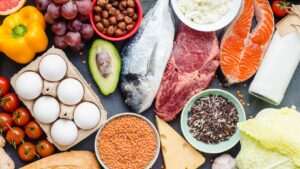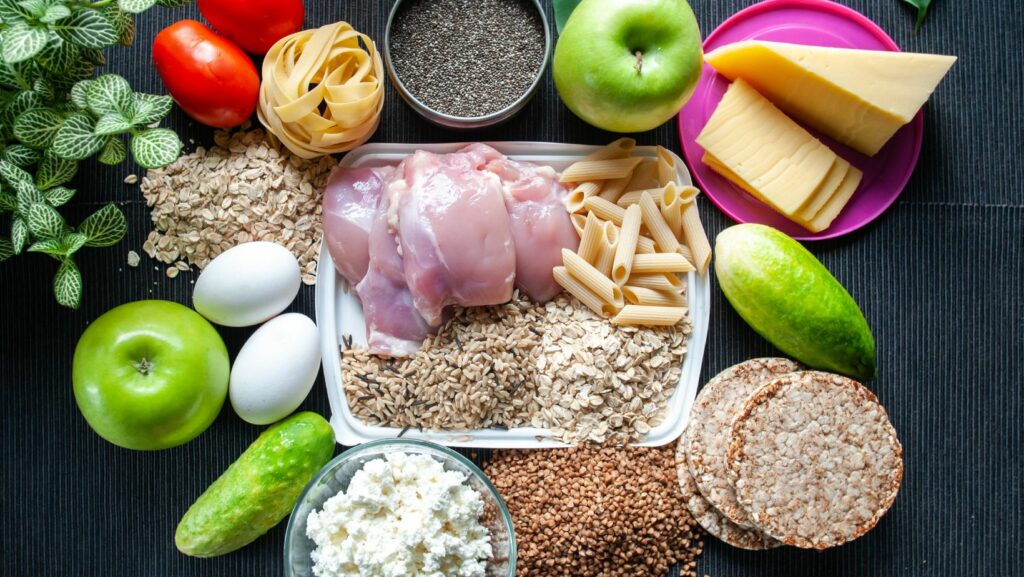Next Level Sports Nutrition
- Custom Nutrition Plans: Next level sports nutrition involves creating personalized dietary strategies that cater to the unique needs of individual athletes, enhancing performance and recovery.
- Key Nutrients: A balanced intake of macronutrients (proteins, carbohydrates, and fats) and micronutrients (vitamins and minerals) is essential for energy support, muscle repair, and overall health.
- Meal Timing Matters: Proper meal timing before, during, and after workouts can significantly optimize energy utilization, enhance performance, and accelerate recovery processes.

- Benefits of Supplements: Innovative supplements like protein powders, creatine, and BCAAs can provide targeted support to improve strength, endurance, and post-exercise recovery for athletes.
- Hydration is Crucial: Maintaining hydration throughout training and competitions is vital for preventing dehydration and ensuring optimal physical function and performance levels.
- Holistic Approach: Combining advanced nutrition strategies with training regimens gives athletes a competitive edge, leading to improved performance outcomes and faster recovery times.
In the competitive world of athletics, achieving peak performance goes beyond just training hard. Next level sports nutrition has emerged as a game-changer for athletes looking to optimize their energy, recovery, and overall health. It focuses on tailoring dietary strategies to individual needs, ensuring that every bite fuels performance and enhances endurance.
Athletes today are discovering that the right nutrition can be as crucial as the right gear. From cutting-edge supplements to personalized meal plans, the landscape of sports nutrition is evolving rapidly. By embracing these advanced nutritional strategies, athletes can unlock their full potential and gain a significant edge over the competition.
Understanding Next Level Sports Nutrition
Next level sports nutrition encompasses customized dietary practices that enhance athletic performance and overall health. This approach integrates science, innovation, and individual needs to create effective nutrition strategies.
Definition and Importance
Next level sports nutrition refers to a comprehensive dietary plan specifically designed for athletes to optimize performance, stamina, and recovery. It addresses individual requirements based on age, gender, body composition, and activity level. Prioritizing nutrition enhances energy availability, reduces the risk of injuries, and improves recovery times, making it a crucial factor for competitive athletes.
Key Components
Key components of next level sports nutrition include:
- Hydration: Maintaining fluid balance supports optimal physiological functions and prevents dehydration during intense activities.
- Macronutrients:
- Carbohydrates provide essential energy for training and competition.
- Proteins facilitate muscle repair and growth, enhancing recovery.
- Fats serve as a concentrated energy source, essential for enduring activities.
- Micronutrients: Vitamins and minerals play important roles in energy production and immune function, contributing to overall health and performance. Key examples include Vitamin D for bone health and Iron for oxygen transport.
- Supplements: Innovative products like protein powders, amino acids, and electrolyte solutions can provide targeted support for specific training needs, enhancing performance.
- Meal Timing: Properly timed meals before, during, and after exercise maximize energy utilization, optimize recovery, and promote muscle repair.
- Personalization: Tailoring nutrition strategies to individual needs ensures that athletes receive the most effective support for their unique physiology and performance goals.
Essential Nutrients for Athletes
Athletes require specific nutrients to support their performance, recovery, and overall health. Two primary categories of nutrients essential for optimal athletic function are macronutrients and micronutrients.
Macros: Proteins, Carbs, and Fats
- Proteins assist in muscle repair and recovery. Approximately 1.2 to 2.0 grams of protein per kilogram of body weight daily is recommended for athletes. High-quality sources include lean meats, fish, dairy, legumes, and plant-based proteins.
- Carbohydrates serve as the primary energy source for athletes. Carbohydrate intake should range from 3 to 10 grams per kilogram of body weight, depending on intensity and duration of activity. Whole grains, fruits, and starchy vegetables offer complex carbohydrates for sustained energy.
- Fats provide long-term energy and support cellular functions. Athletes should aim for 20% to 35% of total daily calories from healthy fats. Sources include avocados, nuts, seeds, and fatty fish, which also supply omega-3 fatty acids beneficial for inflammation reduction.
- Vitamins, such as B-complex vitamins, support energy metabolism and red blood cell production. Antioxidant vitamins, including vitamins C and E, mitigate oxidative stress caused by intense training. A well-rounded diet typically covers vitamin needs, but supplements may benefit specific deficiencies.
- Minerals like calcium and magnesium contribute to bone health and muscle function. Athletes should ensure adequate intake of electrolytes, particularly sodium, potassium, and chloride, to maintain hydration and nerve function. Dark leafy greens, nuts, seeds, and dairy products are rich in essential minerals.
Advanced Strategies
Advanced sports nutrition focuses on strategic meal timing and carefully selected supplements to elevate athletic performance. Both aspects, when finely tuned, contribute significantly to an athlete’s overall success.
Meal Timing and Frequency
Meal timing and frequency play vital roles in optimizing energy levels and recovery. Consuming meals at specific intervals ensures the body receives adequate fuel and nutrients throughout the day.
- Pre-Workout Nutrition: Eating a balanced meal containing carbohydrates and proteins 2 to 3 hours before exercise enhances energy levels. This timing helps utilize glycogen stores effectively during workouts.
- Intra-Workout Nutrition: For longer training sessions, consuming easily digestible carbohydrates during the workout can sustain energy and improve performance. Sports drinks or energy gels often suffice for this purpose.
- Post-Workout Nutrition: Consuming protein-rich foods within 30 minutes post-exercise maximizes recovery. A combination of carbohydrates and proteins, with a ratio of 3:1 or 4:1, supports muscle repair and replenishment of glycogen stores.
- Meal Frequency: Eating smaller, more frequent meals, around 4 to 6 times daily, can stabilize energy levels and enhance nutrient absorption. This approach tailors intake to individual energy needs and activity levels.
Supplements for Enhanced Performance
Supplements provide targeted support to address specific nutritional needs and boost performance. These products can complement a well-rounded diet, enabling athletes to achieve their goals.
- Protein Powders: Whey and plant-based protein powders serve as convenient options for meeting daily protein requirements. They aid muscle recovery and growth, especially when integrated post-workout.
- Creatine: This supplement is well-researched for enhancing high-intensity exercise performance. It promotes increased strength and muscle mass by replenishing ATP stores during short bursts of activity.
- Branched-Chain Amino Acids (BCAAs): BCAAs support muscle recovery by reducing muscle soreness and fatigue. Consuming them before or after workouts enhances endurance and decreases muscle breakdown.
- Omega-3 Fatty Acids: These healthy fats provide anti-inflammatory benefits, contributing to joint health and overall recovery. Sources include fish oil or algal oil supplements, which positively impact cardiovascular function.
- Caffeine: Known for its ergogenic properties, caffeine can improve focus and endurance. A moderate dose before exercise increases stamina and performance, especially in endurance events.
By implementing precise meal timing and selecting appropriate supplements, athletes can optimize their nutrition strategy effectively.
Benefits of Next Level Sports Nutrition
Next level sports nutrition offers substantial benefits that enhance both performance and recovery for athletes. Tailored dietary strategies play a crucial role in achieving these positive outcomes.
Improved Performance
 Improved performance stems from a well-structured nutrition plan. Athletes experience increased energy levels and enhanced endurance through optimal macronutrient ratios. Consuming carbohydrates before training maximizes glycogen stores, while adequate protein intake facilitates muscle repair and growth. Specific supplements, such as creatine and branched-chain amino acids (BCAAs), further contribute to performance by boosting strength and reducing fatigue. Hydration also significantly impacts athletic capabilities, with proper fluid intake preventing dehydration and maintaining peak performance.
Improved performance stems from a well-structured nutrition plan. Athletes experience increased energy levels and enhanced endurance through optimal macronutrient ratios. Consuming carbohydrates before training maximizes glycogen stores, while adequate protein intake facilitates muscle repair and growth. Specific supplements, such as creatine and branched-chain amino acids (BCAAs), further contribute to performance by boosting strength and reducing fatigue. Hydration also significantly impacts athletic capabilities, with proper fluid intake preventing dehydration and maintaining peak performance.
Faster Recovery
Faster recovery is essential for maintaining training intensity and frequency. Incorporating specific nutrients shortly after exercise accelerates the recovery process. Post-workout meals rich in protein help repair muscle damage, while carbohydrates replenish glycogen stores. Antioxidant-rich foods, including berries and leafy greens, mitigate oxidative stress, aiding recovery. Micronutrients, such as magnesium and calcium, support muscle function and reduce cramping. Employing a personalized nutrition strategy ensures that athletes can bounce back quickly, ready for subsequent training sessions or competitions.
Elevate Performance
Next level sports nutrition is a game changer for athletes aiming to elevate their performance. By embracing tailored dietary strategies and innovative supplementation, athletes can unlock their full potential. This comprehensive approach not only enhances energy levels and recovery times but also minimizes injury risks.
Personalized nutrition plans that consider individual needs are essential for achieving optimal results. As athletes continue to recognize the impact of nutrition on their performance, integrating these advanced strategies will become increasingly vital. With the right focus on nutrition, athletes can ensure they stay competitive and maintain peak performance throughout their training and competitions.

